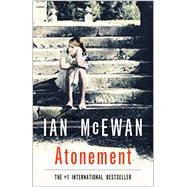On the hottest day of the summer of 1935, thirteen-year-old Briony Tallis sees her sister Cecilia strip off her clothes and plunge into the fountain in the garden of their country house.
Watching her too is Robbie Turner who, like Cecilia, has recently come down from Cambridge. By the end of that day, the lives of all three will have been changed for ever, as Briony commits a crime for which she will spend the rest of her life trying to atone.
Brilliant and utterly enthralling in its depiction of childhood, love and war, England and class, Atonement is a profoundly moving exploration of shame and forgiveness and the difficulty of absolution.








